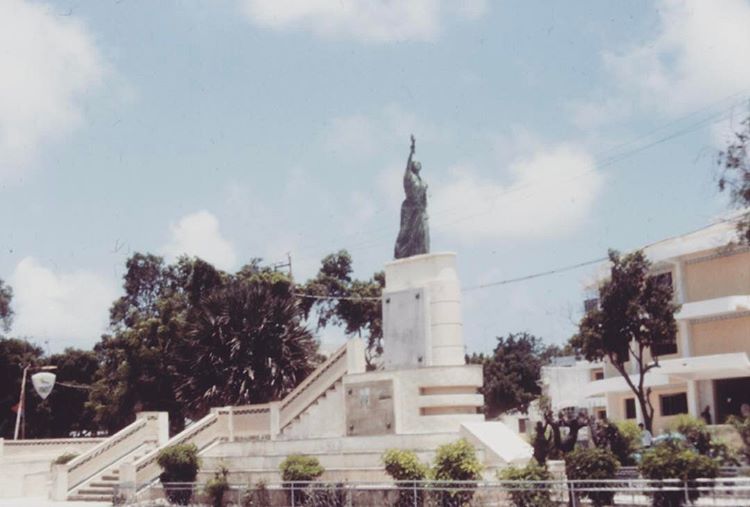Nafiso Qalanjo
𝖂𝖊'𝖗𝖊 𝖌𝖔𝖎𝖓𝖌 𝖙𝖔 𝖜𝖆𝖗 𝖇𝖆𝖇𝖞!
Hawa tako wasn't a hero, but a traitor, and the statue should be brought down. There are more deserving real Somali heros that could replace were she stood.
Hawa tako wasn't a hero, but a traitor, and the statue should be brought down. There are more deserving real Somali heros that could replace were she stood.

Hawa tako wasn't a hero, but a traitor, and the statue should be brought down. There are more deserving real Somali heros that could replace were she stood.
Lies from the Kacaan have distorted the beliefs of many Somalis.
It's sad how Hawo Tako got reshaped and turned as a hero, yet Sheikh Hassan Barsane's struggle against the Italians/Ethiopians was forgotten.
I wouldn't trust the italian source. Italians like to pretend that Somalis love them. There is little imformation on Hawo Tako , no picture, no witnesses talking about here nothing.Hawa tako wasn't a hero, but a traitor, and the statue should be brought down. There are more deserving real Somali heros that could replace were she stood.

There are zero historical records about her so how can they say she married an italian? Hawo tako isn't even areal name, we don't even have her three names Hawo Tako ina ayo? What was here clan? How old was she? If we don't know anything about these infos how can we accept some random italian news site saying she was pro italian? There are actual somali sources wjo say she was on the opposite side and was killed by a pro italian SomaliShe was married to an Italian?
I don't understand the point of propping up a traitor as a hero and ignoring the accomplishments of actual heros.



This is a good example as to why this type of propaganda spread bitter folks like this who are worried about “what about my clan”.Imagine a lady (Hawo Tako) who was borderline catholic and was married to an Italian man is a Somali 'hero' for throwing a stone and the Bimal jihad leaders like Gafle who fought the biggest anti colonial struggle in southern Somalia and fought the Italians and Somali dabodhilifs for 20 years aren't even remembered. Sh Barsane was a great leader who has been forgotten.
Kacaan propaganda favouring certain clans. No surprises here.

Nothing there is the truth its all some nonsense peddled by landers which is why there is no response to mine. Gods judgement will fall on anyone slandering a muslim woman. Take your stubbornness to the grave.I see the truth triggers you.
Believe what you want to believe, but you cant change is the truth no matter what you tell yourself.This is a good example as to why this type of propaganda spread bitter folks like this who are worried about “what about my clan”.
Imagine calling a muslim Somali hero a catholic because of clan then trying to say anyone else is guilty of clannism
Nothing there is the truth its all some nonsense peddled by landers which is why there is no response to mine. Gods judgement will fall on anyone slandering a muslim woman. Take your stubbornness to the grave.
is there any evidence beside twitter ?Hawa tako wasn't a hero, but a traitor, and the statue should be brought down. There are more deserving real Somali heros that could replace were she stood.
You have no rebuttal because you got your “research” from a tweet by a lander and didnt even know what sources he was quoting and didnt even know what the quotes said you literally just followed the caption.Believe what you want to believe, but you cant change the truth no matter what you tell yourself. Hawa tako was used as a kacaan symbolic hero even though historically she was on the opposing side of Somali liberation. Feel free to do your own research on this if your not fully convinced.

Can you post a pre 2000s source that says Xaawo Taako worked with Italians or married an Italian?Believe what you want to believe, but you cant change is the truth no matter what you tell yourself.
I didnt even know he was a lander. I guess you do qabil checks of every Somali twitter account dont you? Also he gave his sources in the thread. That is if you checked for it at all. And none of these eye witness seem old enough to alive when she was alive. Some of these men can be her grandchildrenYou have no rebuttal because you got your “research” from a tweet by a lander and didnt even know what sources he was quoting and didnt even know what the quotes said you literally just followed the caption.
Here is a video from a Benadiri Nabadoon named Maxamed bin Cali Uunsane who was an eyewitness he speaks in a documentary by universal TV on the Heroine.
courtesy of @embarassing
